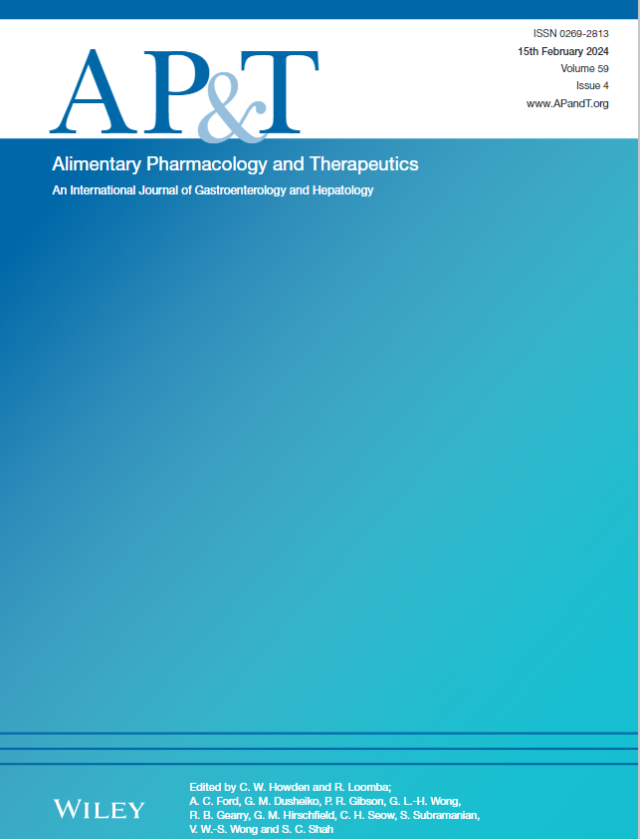Mirikizumab诱导治疗溃疡性结肠炎患者的有效性和安全性:一项多中心回顾性观察研究
IF 6.6
1区 医学
Q1 GASTROENTEROLOGY & HEPATOLOGY
引用次数: 0
摘要
在随机对照试验中,mirikizumab实现了中度至重度溃疡性结肠炎(UC)患者的临床缓解和改善结局。然而,目前还没有mirikizumab的真实世界证据。目的评价米利珠单抗在现实世界中的有效性和安全性。方法在一项针对三家机构的回顾性队列研究中,我们纳入了在2023年6月至2024年4月期间首次接受mirikizumab治疗的UC患者。主要结局是第0周至第12周部分梅奥评分(PMS)的变化。次要结局包括从第0周到第12周血清C反应蛋白(CRP)和富含亮氨酸的α2糖蛋白(LRG)水平的变化;临床缓解率(PMS <;2例直肠出血亚评分为0),CRP缓解率(<;3.0 mg/L), LRG缓解率(<;12.7 μg/mL);诱导治疗期间的不良事件。结果纳入52例患者。PMS中位数(四分位间距)从第0周到第12周(5[3-6]到第2周[0 - 3])下降,p <;0.001)。CRP和LRG水平也下降(CRP: 3.8[0.9-7.3]至1.8 [0.5-4.0]mg/L, p = 0.015;它有:20.1(16.3 - -23.2),15.9(12.8 - -23.2)μg / mL, p = 0.014)。第12周临床缓解率、CRP缓解率和LRG缓解率分别为44.2%、67.3%和27.3%。没有不良事件导致永久停用米利珠单抗或死亡。结论:这项现实世界的研究证明了mirikizumab治疗UC患者的短期有效性和安全性。本文章由计算机程序翻译,如有差异,请以英文原文为准。
Real‐World Effectiveness and Safety of Mirikizumab Induction Therapy in Patients With Ulcerative Colitis: A Multicentre Retrospective Observational Study
BackgroundIn randomised controlled trials, mirikizumab achieved clinical remission and improved outcomes of patients with moderate to severe ulcerative colitis (UC). However, there is currently no real‐world evidence for mirikizumab.AimTo evaluate the real‐world effectiveness and safety of mirikizumab.MethodsIn a retrospective cohort study among three facilities, we included patients with UC who first received mirikizumab between June 2023 and April 2024. The primary outcome was the change in the partial Mayo score (PMS) from week 0 to 12. Secondary outcomes included changes in serum C‐reactive protein (CRP) and leucine‐rich α2‐glycoprotein (LRG) levels from week 0 to 12; clinical remission rate (PMS < 2 with rectal bleeding subscore of 0), CRP remission rate (< 3.0 mg/L), and LRG remission rate (< 12.7 μg/mL) at week 12; and adverse events during induction therapy.ResultsWe included 52 patients. Median (interquartile range) PMS decreased from week 0 to 12 (5 [3–6] to 2 [0–3], p < 0.001). CRP and LRG levels also decreased (CRP: 3.8 [0.9–7.3] to 1.8 [0.5–4.0] mg/L, p = 0.015; LRG: 20.1 [16.3–23.2] to 15.9 [12.8–23.2] μg/mL, p = 0.014). Rates of clinical remission, CRP remission, and LRG remission at week 12 were 44.2%, 67.3%, and 27.3%, respectively. There were no adverse events leading to permanent discontinuation of mirikizumab or death.ConclusionThis real‐world study demonstrated the short‐term effectiveness and safety of mirikizumab in patients with UC.
求助全文
通过发布文献求助,成功后即可免费获取论文全文。
去求助
来源期刊
CiteScore
15.60
自引率
7.90%
发文量
527
审稿时长
3-6 weeks
期刊介绍:
Alimentary Pharmacology & Therapeutics is a global pharmacology journal focused on the impact of drugs on the human gastrointestinal and hepato-biliary systems. It covers a diverse range of topics, often with immediate clinical relevance to its readership.

 求助内容:
求助内容: 应助结果提醒方式:
应助结果提醒方式:


